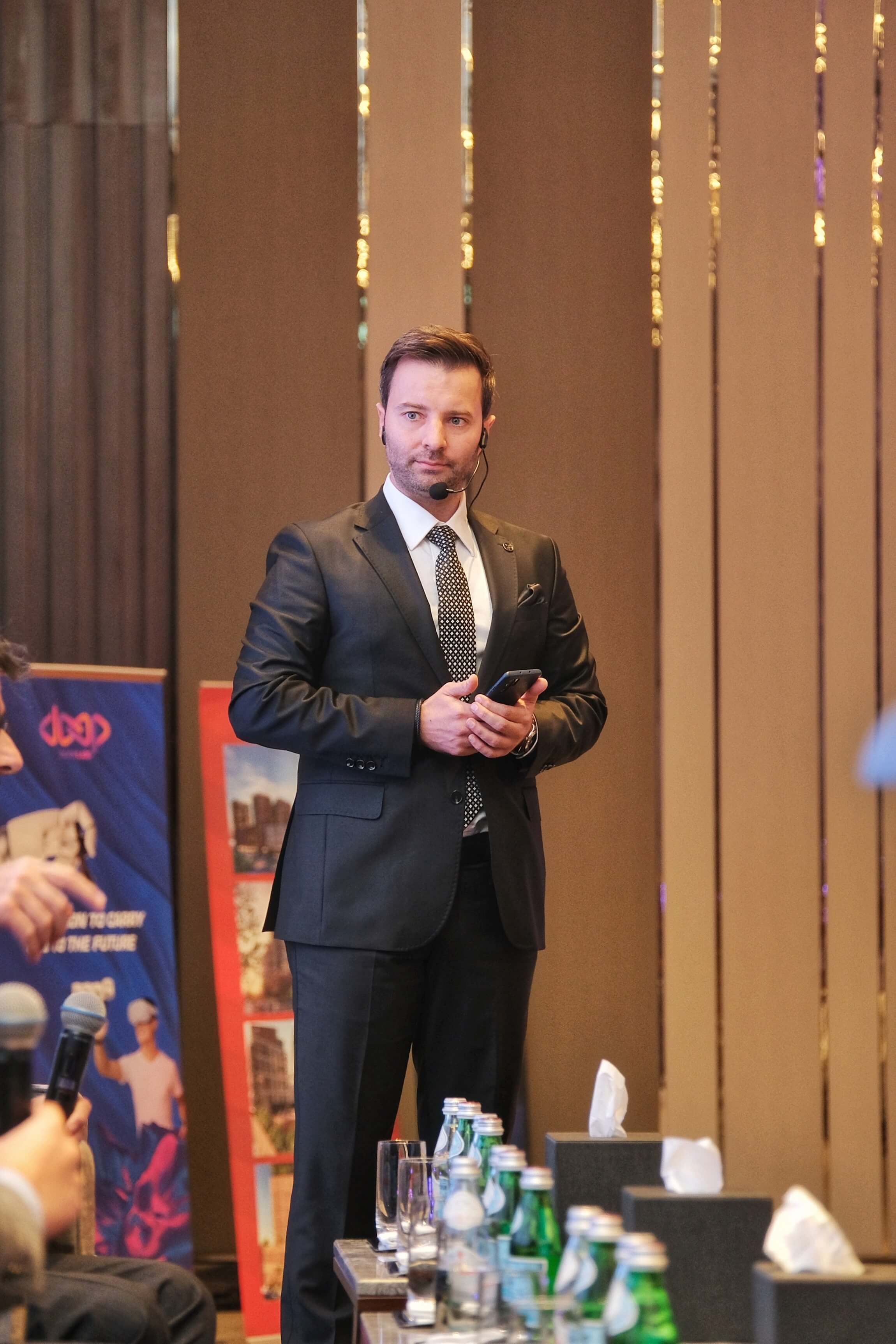The Turbulent Waters of International Real Estate: An Exclusive Interview with Mahir Abdulkadiroglu

In the world of international real estate, one man’s journey stands out as a testament to the diverse and dynamic nature of the industry. We sat down with a seasoned expert who has played a pivotal role in reshaping the landscape of property investments in Turkey, unveiling the fascinating story of how he embarked on his real estate odyssey and the evolution of the Turkish real estate market over the past decade.
In 2012, this visionary, Mahir Abdulkadiroglu, hailing from Arabic-speaking roots but fluent in German and English, found himself at the crossroads of linguistic mishaps during a job interview. What was initially a job offer for an office in Germany took an unexpected turn, redirecting our interviewee to the heart of Istanbul – the sales office of Maslak 1453. Little did he know that this twist of fate would lay the foundation for his remarkable journey in the Turkish real estate sector.

During the event in Kuwait. Source: Personal Archive
Mahir, the last ten years have seen significant interest from foreigners in the Turkish real estate market. Could you tell us which regions have shown the most demand and how this demand has evolved over the years?
Over the last decade, the Turkish real estate market has witnessed an evolving landscape in terms of foreign demand. Between 2012 and 2018, it was mainly the citizens of Saudi Arabia, Kuwait, and the United Arab Emirates who dominated property purchases in Turkey. They were motivated by both investment and residential purposes. However, 2018 brought about a significant shift in the motivation behind these purchases. Many buyers were now driven by the desire to obtain Turkish citizenship. This attracted buyers from Libya, Iraq, and Iran, who grew interested in property acquisitions.
Are the property purchases by foreigners mainly for investment or residential purposes, and how do these preferences vary by nationality and city?
When it comes to the intentions behind foreign property purchases, it’s a multifaceted picture influenced by nationality, city, and property type. For Gulf citizens, about 65% of investors buy for investment purposes, while the remaining 35% are considering these properties for residential use. City-wise, Istanbul, over the past decade, saw an almost equal split, with roughly 50% of property purchases driven by investment and the other 50% motivated by the desire for a residential property. However, the picture differs in various cities. In Bursa, it’s largely a 65% residential and 35% investment scenario, and in cities like Antalya and Bodrum, it’s a 65% residential and 35% investment distribution. The city of Trabzon, in contrast, sees a 75% residential and 25% investment ratio.

During a conference. Source: Personal Archive
Could you elaborate on which cities in Turkey are prominent among investors from different Gulf and Arab countries and the reasons behind their preferences for these cities?
Each Gulf and Arab country has its unique preferences and priorities when it comes to property investments in Turkey. For instance, Iraqi citizens often favor Istanbul, largely due to their involvement in commercial enterprises like import, export, the gold industry, and general trade. On the other hand, investors from Saudi Arabia, Qatar, and the United Arab Emirates tend to gravitate towards high-end luxury projects in prestigious areas of Istanbul, including commercial centers. Kuwaiti investors, in contrast, tend to seek tranquility and a clean environment, which leads them to explore the city of Bursa and its serene surroundings.

In Dubai. Source: Personal Archive
What are the key features foreign investors, particularly from Gulf countries, look for in luxury and branded residential projects, and how do their expectations differ from domestic customers?
Regarding luxury and branded residential projects, foreign investors, especially those from Gulf countries, place a high premium on the property’s location. Proximity to the city center and amenities like shopping centers in the vicinity are significant considerations. They also expect a well-trained and knowledgeable staff within the project to make their experience as seamless as possible.
Regarding the interior features of the apartments, foreign investors, particularly those from Gulf countries, attach great importance to the number of bathrooms in the property, as well as the size of the rooms. They typically favor 3+1 and larger apartment layouts. Living in a four-bedroom apartment with only two bathrooms, for instance, is considered less than ideal for them, as they are accustomed to more spacious living arrangements in their home countries, where each room typically has its bathroom.
Magnet Consulting was established in 2018 with a clear vision to provide robust support to Turkish companies operating in foreign countries. Could you detail the services you offer to these brands and how they address the challenges they face?
Magnet Consulting offers tailored services to Turkish companies with operations abroad. These services include marketing support, assistance in establishing sales offices abroad, team formation, legal guidance, and support in navigating foreign laws and cultures. Magnet also ensures ongoing support to help the team operate efficiently. The company’s role also encompasses protecting and guiding businesses to navigate potential challenges or issues arising from differences in laws, cultures, and traditions. Magnet further provides protocol advice for companies entering new markets and offers feasibility studies for various projects, product sales, or market expansion. To foster strong and enduring relationships between companies and international clients, Magnet organizes joint events and activities.
“I want to offer advice to Turkish business owners venturing into foreign markets. It’s crucial to approach these opportunities with caution, considering the significant disparities in legal systems. I recommend that Turkish marketing and construction companies adopt the principle of “teach me how to fish instead of giving me fish.” This means taking the time to understand the complexities of foreign laws and cultures, as this understanding is key to achieving success in international business ventures.”
What advantages do foreigners gain when they buy property in Turkey, such as residence permits and citizenship? Could you explain the minimum investment requirements for these benefits?
Foreigners purchasing property in Turkey can enjoy various benefits, including obtaining tourist or investor residence permits. However, Gulf investors often opt for visas due to application complexities. Generally, any property owner with a title deed can obtain a residence permit, regardless of the property’s price or location. For those aiming to acquire Turkish citizenship, the minimum investment required is $400,000. Specific conditions apply, such as the property owner being a Turkish citizen or a Turkish company. To prevent issues or fraud, property valuation by experts is conducted to ensure the accuracy of the investment.

